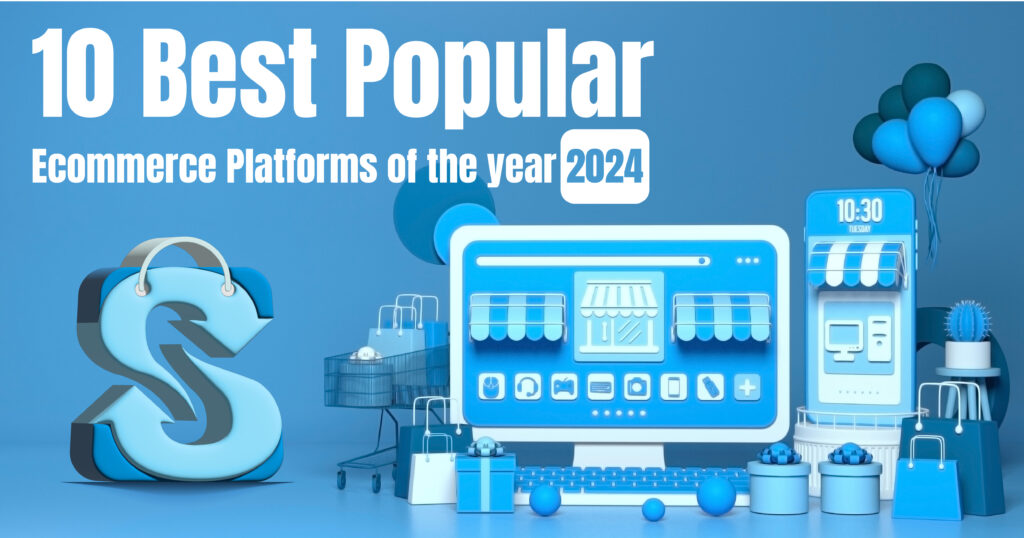
10 Best Popular Ecommerce Platforms of the year 2024

Happy New Year to you all!
As we step into 2024, the peak of digital era, selecting the ideal platform for your online store is important for success. The available options are more diverse and feature-rich than ever before. This comprehensive blog explores the top 10 ecommerce platforms, suitable for businesses of all sizes.
Whether you’re a seasoned entrepreneur or starting on your first online venture, this blog will provide insights to make an informed decision for your online store.
10 Best Ecommerce Platforms of the year 2024
- Shopify
- Singlebag
- WooCommerce
- BigCommerce
- Magento
- Wix
- Squarespace
- OpenKart
- Volusion
- Prestashop
Shopify: A Pioneer in Ecommerce
Shopify, a pioneer in the ecommerce field, continues to be a leading choice for businesses worldwide. Its user-friendly interface and extensive app store make it an accessible option for beginners, while its scalability caters to established enterprises.
With an array of customizable templates, seamless payment integration, and robust analytics, Shopify remains a powerhouse in the ecommerce arena.
Singlebag: A Shopify Alternative in India
Singlebag, a Shopify alternative in India, is a mobile-friendly, secure ecommerce platform built on Laravel Framework. With essential marketing tools, global currency support, and unique features like Dropshipping and a Supplier Platform, Singlebag is an affordable choice for Indian sellers.
The platform’s Partner Program offers a competitive 25% recurring revenue share, and its Delivery Agent App empowers sellers to manage their own deliveries, distinguishing it as a versatile and cost-effective option for ecommerce in India.
WooCommerce: Seamless WordPress Integration
WooCommerce’s seamless integration with WordPress offers businesses a potent and customizable solution. This platform is an excellent choice for those familiar with the WordPress ecosystem, providing a user-friendly interface for managing products, orders, and customer data.
Its versatility allows for easy scaling, making it an attractive option for businesses at various stages of growth.
BigCommerce: Scalability at Its Core
BigCommerce distinguishes itself with a focus on scalability, making it an excellent choice for businesses meant for growth. Its extensive feature set includes advanced marketing tools, multi-channel selling capabilities, and robust analytics.
Whether you’re a startup or an established brand, BigCommerce provides the tools needed to build and expand your online presence.
Magento: Open-Source Flexibility
As an open-source platform, Magento offers unparalleled flexibility and customization options. Suited for larger enterprises, Magento empowers businesses to tailor their online stores to precise specifications.
With a vast community of developers and a robust extension marketplace, Magento remains a go-to choose for those seeking a high degree of customization.
Wix eCommerce: Simplicity Meets Functionality
Known for its user-friendly website builder, Wix extends its appeal to ecommerce with a platform that strikes a harmonious balance between simplicity and functionality.
Wix’s drag-and-drop interface simplifies the store-building process, while its App Market allows for easy integration of additional features. This makes Wix a compelling option for entrepreneurs seeking an uncomplicated yet powerful ecommerce solution.
Squarespace: Aesthetic Appeal for Artistic Ventures
Squarespace stands out by placing a strong emphasis on design, making it an ideal choice for businesses with a focus on aesthetics. Creatives and those in the art and fashion industries appreciate Squarespace’s visually appealing templates and intuitive design tools.
While catering to the visually inclined, Squarespace doesn’t compromise on ecommerce functionality. It is offering a seamless blend of style and substance.
OpenCart: Open-Source, User-Friendly Solution
OpenCart’s user-friendly, open-source ecommerce solution is tailored for businesses with budget constraints. The platform’s intuitive admin interface simplifies store management, while its active community ensures ongoing support and development.
OpenCart’s feature-rich environment provides a comprehensive solution for small to medium-sized businesses looking for an affordable yet robust ecommerce platform.
Volusion: Feature-Packed for All-In-One Solutions
Volusion distinguishes itself as an all-in-one ecommerce solution, offering a comprehensive set of features to streamline operations. Notable for robust inventory management, secure payment processing, and customizable storefronts, Volusion caters to businesses seeking an all-encompassing solution.
With built-in marketing tools and analytics, it empowers merchants to manage their online stores efficiently.
PrestaShop: Customization for the Tech-Savvy
PrestaShop, an open-source platform, caters to the tech-savvy entrepreneur with its extensive range of modules and themes. The platform’s flexibility allows for deep customization, making it suitable for businesses with specific requirements.
PrestaShop’s active community ensures continuous updates and support, contributing to its popularity among those seeking a highly customizable ecommerce solution.
Shopify Alternatives in India
Ecommerce is projected to have its market more extensive in India. Considering the unique demands of the Indian market, it’s crucial to explore platforms tailored specifically to your region. Apart from Shopify and WooCommerce, Singlebag and Zoho emerges as strong contenders in India.
Singlebag is the best ecommerce platform in India providing best features in affordable price especially for small businesses. “Ecommerce for Everyone” is the motto of Singlebag.
Zoho Commerce caters specifically to Indian businesses, providing localized features and payment options, enhancing the ecommerce experience for Indian entrepreneurs. Its integration with other Zoho products streamlines business operations, making it an enticing option for those seeking a comprehensive solution tailored to the Indian market.
Additionally, KartRocket, an Indian ecommerce platform, caters specifically to local businesses with features tailored to the Indian ecommerce landscape. It focuses on simplifying the online selling process for small and medium-sized businesses, making it a noteworthy alternative for Indian entrepreneurs looking for a platform that understands and addresses their unique needs.
Conclusion
Selecting the right ecommerce platform is pivotal for the success of your online business. The diverse options cater to various needs, whether you prioritize user-friendliness, scalability, or localization.
Evaluate your business requirements, consider your target audience, and make an informed choice to ensure your online store’s success and growth in 2024 and beyond. Your ecommerce journey begins with the right platform, setting the stage for a thriving online presence.
Remember, the key to a successful online store is not just the products you sell but the platform you choose to showcase them. Choose wisely, and here’s to a prosperous year in ecommerce!






Responses